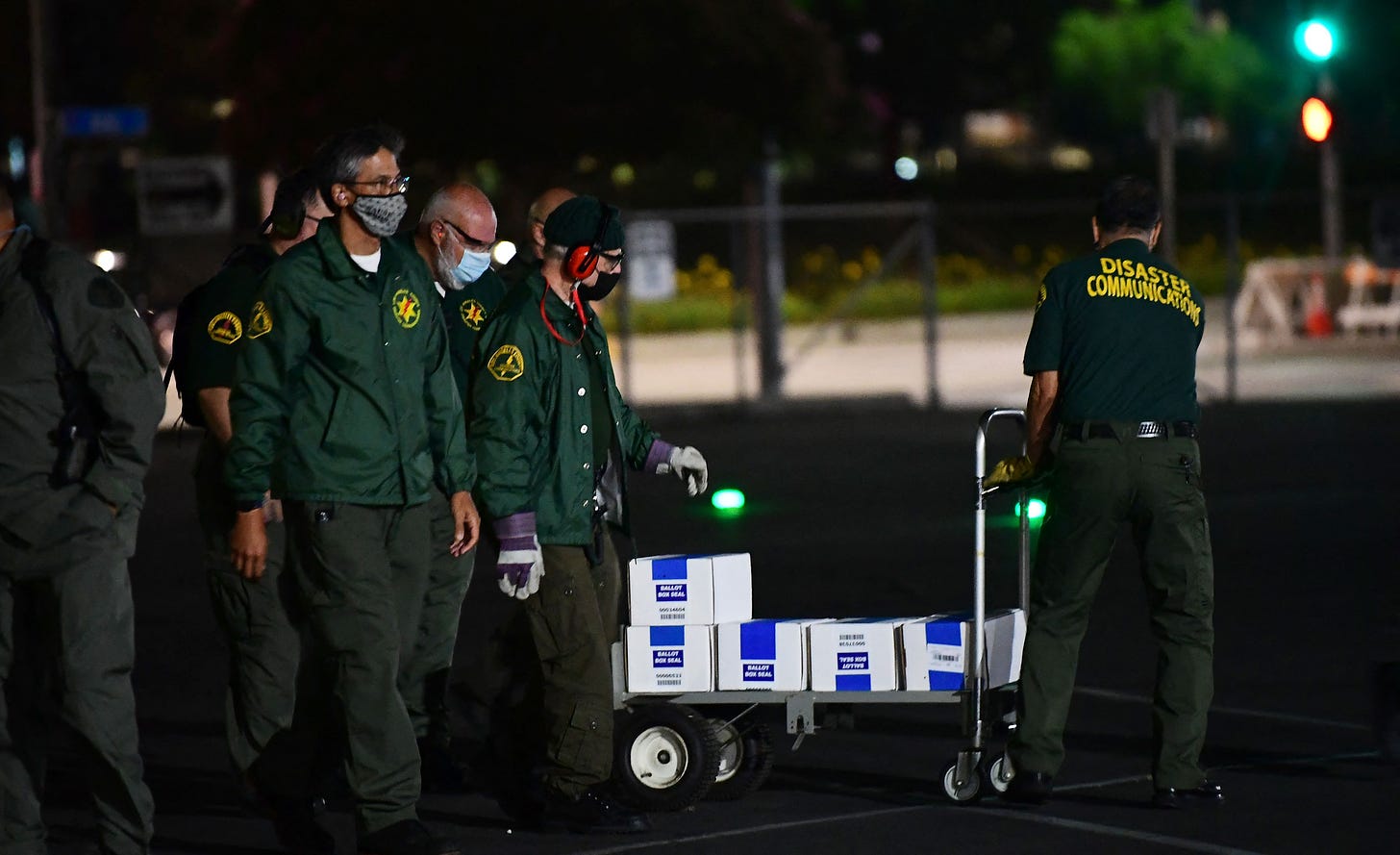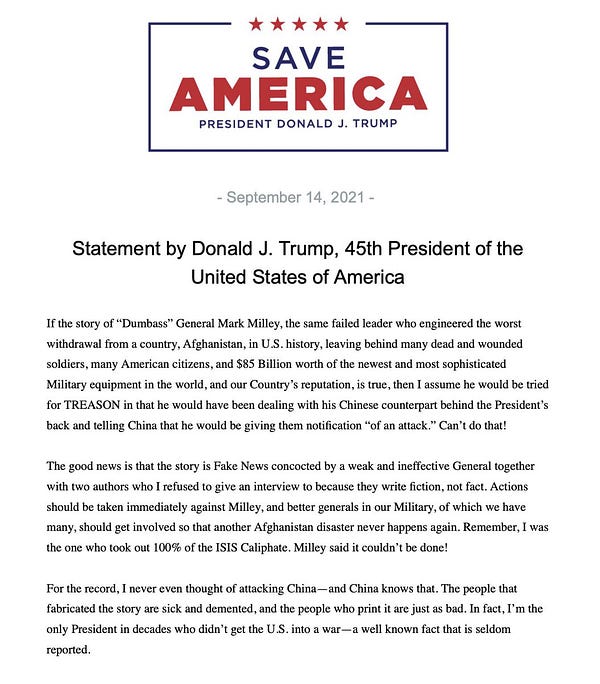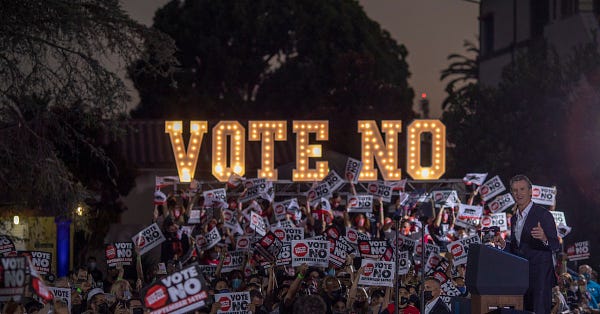
In the end, it wasn’t even remotely close. California voters rejected a GOP-led recall of Governor Gavin Newsom by a landslide margin of 64-36 — a 28-point shellacking.
Yes, this is what we should have expected from such a heavily Democratic state, but it might have been (much) closer if the vote had been a straight up-or-down referendum on Newsom himself. Instead, it became a referendum on “the abyss.”
The abyss, of course, was Trumpism.
This seems a point worth pondering, as the GOP contemplates lashing itself even more tightly to the Orange Man-Child of Mar-a-Lago.
The California fiasco will probably not be enough to prompt the sort of introspection that Republicans so desperately need. But as 2024 looms, it provides one more reason for Republicans to ask themselves: Do they really want to do this again?
The great political mystery of our time has been the refusal of the GOP to take the many off-ramps from Trumpism.
They could have put the petulant, disgraced, defeated one-term president firmly in the rearview mirror — but, instead, they have embraced their hostage status with an obsequiousness that makes the Stockholm Syndrome seem quaint.
Republicans could have moved on after the election; they certainly could have bailed after January 6. They even had a chance to wipe the slime off during the impeachment process. They could have refused to go along with the Big Lie and easily segued into post-Trumpian oppositional politics.
Instead, they are poised to wear Trumpism like a coat of many colors into the mid-terms; and to nominate him for a second term in 2024, so that he can wage his paranoid revenge campaign against his enemies.
This is not — to say the very least — an obvious choice. The GOP no longer faces a binary choice that forces them to hold their noses. They can’t rationalize that only Trump would give them the policies and judges they want. And it’s is far from clear that he provides the only, or the best hope to seize back power.
Quite the opposite.
As Clay Risen noted yesterday “Newsom and the Democrats seem to have persuasively argued that he was running not on his record or against a particular candidate, but against Trumpism. . . .”
“In a vacuum, there was a lot of discontentment with Newsom and ambivalence with him among Democrats,” said Rob Stutzman, a Republican political consultant in California.
That started to change once “the abyss” got a name.
The election also represented the ascendancy (and vulnerability) of the entertainment wing of the GOP. As Risen noted:
Mr. Elder isn’t a serious politician; he’s running not to win, but to raise his media profile. But that very fact says something about today’s Republican Party. Many of its highest-profile figures blur the line between politician and celebrity, and act accordingly, even if their success as the latter undermines what we expect out of the former. Marjorie Taylor Greene and Madison Cawthorn — and, yes, Larry Elder — are only nominally politicians. In substance, they’re entertainers.
They also put Donald Trump on the ballot. As Perry Bacon Jr. notes this morning: “The rise of [Larry] Elder, whom Democrats cast as a California Donald Trump, was ‘perfect,’ [Newsom senior adviser Addisu] Demissie said. ‘Couldn’t have been better. He made no effort to appeal to anyone outside of his base.’”
“Newsom’s victory,” writes Bacon, “suggests that running as the anti-Trumpism party still has real political value, even with Trump no longer in the White House.”
BONUS: The California results were a repudiation of anti-mask, anti-vax politics — a clear sign that Republican opposition to precautions against the pandemic is a colossal miscalculation. As the AP notes this morning: “The Republicans running to replace Newsom opposed mask and vaccine mandates, and the California governor was happy to highlight that. Newsom aired an ad calling the recall ‘a matter of life and death’ and accusing the top Republican candidate, talk radio host Larry Elder, of ‘peddling deadly conspiracy theories.’”
Do They Really Want To Give Him a Second Term?
In case the California results were not enough to focus the mind, consider what we are learning from the new book by Bob Woodward and Robert Costa.
Here are just a few takeaways:
The nation’s top generals worried that he would go nuclear or start a war.
[General Mark] Milley worried that Trump could 'go rogue,' the authors write.
"You never know what a president's trigger point is," Milley told his senior staff, according to the book.
In response, Milley took extraordinary action, and called a secret meeting in his Pentagon office on January 8 to review the process for military action, including launching nuclear weapons. Speaking to senior military officials in charge of the National Military Command Center, the Pentagon's war room, Milley instructed them not to take orders from anyone unless he was involved.
"No matter what you are told, you do the procedure. You do the process. And I'm part of that procedure," Milley told the officers, according to the book. He then went around the room, looked each officer in the eye, and asked them to verbally confirm they understood.
"Got it?" Milley asked, according to the book.
**
He could have done it:

**
General Milley thought Trump was nuts.
Later that day, General Milley spoke to Speaker Nancy Pelosi, who was growing increasingly concerned Mr. Trump would lash out and use military force.
“This is bad, but who knows what he might do?” Ms. Pelosi said. “He’s crazy. You know he’s crazy. He’s been crazy for a long time. So don’t say you don’t know what his state of mind is.”
“Madam Speaker,” General Milley said, “I agree with you on everything.”
**
Trump had signed an order to abruptly pull out of Afghanistan.
"Right after Trump lost the election, Milley discovered the President had signed a military order to withdraw all troops from Afghanistan by January 15, 2021, before he left the White House."
As our colleague Sarah Longwell wrote:


**
Mike Pence was even more of windsock than we thought
The book also reveals how Vice President Mike Pence struggled more than was publicly known over how to navigate Mr. Trump’s demands that he upend the election certification. Speaking privately to former Vice President Dan Quayle, who oversaw the certification of the 1992 election in which he was on the losing ticket, Mr. Pence appeared open to going along with Mr. Trump’s plan, pushed the false claim that Arizona’s voting results were wrong and asked whether there was any way he could delay certification.
**
Dan Quayle may have saved democracy.
In the days leading up to Jan. 6, Mr. Pence called Mr. Quayle, the only living Republican vice president forced to certify an election in which he was on the losing ticket.
Mr. Pence told him that the president was convinced that Mr. Pence could throw out the election results in order to keep himself in power.
“Mike, you have no flexibility on this,” Mr. Quayle told Mr. Pence. “None. Zero. Forget it. Put it away.”
**
Kevin McCarthy’s lickspittle routine may not be enough to save him from TFG’s wrath.
The book also reveals that Trump is still angry with Republicans who blamed him for the insurrection, including House Minority Leader Kevin McCarthy.
"This guy called me every single day, pretended to be my best friend, and then, he fucked me. He's not a good guy," Trump said, according to the book.
While McCarthy has walked back his initial comments after the insurrection, Trump is quoted as dismissing McCarthy's attempts to get back into his good graces.
"Kevin came down to kiss my ass and wants my help to win the House back," Trump said, according to the authors.
**
Exit take: This is the man the GOP wants to put back into the White House?


The Trump Coup is Ongoing
Your daily Must Read comes from Kevin Williamson in the NYT.
The Trump administration was grotesque in its cruelty and incompetence. But without the coup attempt, it might have been possible to work out a modus vivendi between anti-Trump conservatives and Mr. Trump’s right-wing nationalist-populists. Conservatives were not happy with Mr. Trump’s histrionics, but many were reasonably satisfied with all those Federalist Society judges and his signature on Paul Ryan’s tax bill….
In the normal course of democratic politics, people who disagree about one issue can work together when they agree about another. We can fight over taxes or trade policy.
But there isn’t really any middle ground on overthrowing the government. And that is what Mr. Trump and his allies were up to in 2020, through both violent and nonviolent means — and continue to be up to today.
When it comes to a coup, you’re either in or you’re out. The Republican Party is leaning pretty strongly toward in. That is going to leave at least some conservatives out — and, in all likelihood, permanently out.
The Klobuchar-Manchin Voting Rights Bill
In the Atlantic, Norm Ornstein and Dennis Aftergut write:
Amy Klobuchar, Joe Manchin, and several of their Democratic colleagues in the Senate have produced the Freedom to Vote Act, a stellar election-protection compromise bill that safeguards both the right to vote and the integrity of future federal elections. Before skeptics start questioning whether the bill will attract the 10 Republican votes necessary to overcome a filibuster, let’s acknowledge key aspects of this achievement.
First, the bill combines important protections from the House-passed For the People Act and Senator Raphael Warnock’s Preventing Election Subversion Act. It is designed to counter the pernicious provisions in laws in states such as Georgia and Texas aimed at allowing partisans to overturn lawful elections. It puts in place procedural safeguards against local election officials being removed for partisan purposes and makes intimidating election workers a felony.
The compromise supplements those bills with sensible and accessible validation requirements in states that currently require voter identification, usually by documents that are not handy to voters.
I also had some more thoughts on vaccine disinformation and Nick Minaj.

Quick Hits
1. Norm Macdonald, 1959-2021
In today’s Bulwark, Sonny Bunch has an eloquent tribute to the legendary comedian.
Norm Macdonald, dead at 61 following a long and private battle with cancer, was the consummate comic’s comic. Beloved by standups and audiences alike, even when they were somewhat befuddled by the laconic nature of his act, Macdonald’s theory of comedy was as simple as it is terribly difficult: He thought the joke should be the punchline.
2. Taliban 2.0
Charles H. Fairbanks, Jr. reminds us that “moderation” can be dangerous, too.
Current opinion sees Taliban’s human rights practices, above all the treatment of women, as an overall indicator of across-the-board moderation.
But it does not follow that a regime which treats women slightly better will also refrain from conducting terrorism. Just to take one example: Iranian policies toward the hijab were enforced more selectively during the years when Iran aggressively expanded its attacks against America in Syria and Iraq.
And crucially, Iran has been a much greater danger to U.S. interests than even more extremist groups such as ISIS or Boko Haram in part because Iran has been “moderate” enough to be able to wield the powers and privileges of an organized state.
Policy is not made in a single area, nor is political moderation one thing. The Taliban has motives to consolidate its gains and maintain the state structure it has conquered. It also has a powerful impulse to build triumph on triumph. These two goals may be in tension. And so we should expect that any “moderation” in the Taliban will (1) be done in service to ultimate goals that run counter to American interests and (2) be transitory.
3. Putin Is Quarantining. What Would Happen If He Died?
Ben Parker notes that like most autocrats, he has no successor lined up.
In an important sense, Putin has and can have no successor. Like almost every Russian leader before him dating back to the Bolshevik Revolution, he has redefined the job of Russian leader according to his own personality, preferences, and situation. Lenin’s leadership of the revolutionary party was markedly different from Stalin’s totalitarian nightmare (though it did establish the precedents for it). Khrushchev’s reformist revisionism and anti-Stalinism represented yet another change. Brezhnev presided for nearly two decades over a system of collective, consensus-driven decision-making at the top of the state-party system, to the point that in his senility, senior party leaders disguised his hospital room so the people of the Soviet Union wouldn’t know he was sick. Gorbachev attempted to return to the pre-Brezhnev system of supreme control when instituting glasnost and perestroika, only to wind up with a schism in the party, an attempted military coup, and his country dissolving underneath him. Yeltsin largely defined the concept of the “president of Russia,” having been the first to hold the post under both the Soviet system and the new Russian constitution. Part of his definition included election campaigns driven by oligarchs and shelling the legislature.
Cheap Shots


It’s all relative.





